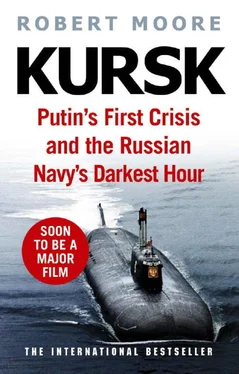The Kursk ’s most distinctive feature was her double hull. The outer hydrodynamic hull was made from a high-quality material known as ‘austenitic steel’, with a high-nickel, high-chrome content. Just a third of an inch thick, it was not only strongly resistant to corrosion but had a lower magnetic signature, making it more difficult to track through the water. The inner pressure hull was much thicker, about two inches of high-alloy steel, providing the boat with impressive strength and structural stability. Sitting amid some of the most resource-rich territories in the world, the engineers felt little need to economize on the quality of their steel. The double hulls, with a space of over six and a half feet between them, greatly improved the Kursk ’s ability to survive a collision or torpedo attack.
Her internal design showed considerable flair and attention to detail as well. Compared with the earlier generation of claustrophobic and noisy Soviet submarines, the Kursk was fitted with extraordinary luxuries, including a relaxation area where the sailors could read or listen to music, a small aquarium and a sauna.
One cool day in March 1995 a quiet ceremony was held in the docks of Vidyaevo. An Orthodox priest, Father Ioann, walked down the ranks of the sailors lining the pier. To each of them he handed a small icon of St Nicholas, the patron saint of sailors. In the new Russia, where communist faith had collapsed and religion was filling the void, even a nuclear submarine needed to be baptized.
Father Ioann solemnly sprinkled holy water over the bow while an assistant murmured prayers and burned incense in a small cup. Finally, after being given a tour of the submarine, the priest handed to the Fleet command a twelfth-century icon of Our Lady of Kursk. With reverence and pride, the medieval treasure was placed near the command centre to act as the submarine’s protector, guaranteeing safe voyages in defence of the Russian motherland.
II: 8 a.m., THURSDAY, 10 AUGUST
Vidyaevo Naval Docks
Anyone watching from the pier would have noticed the men’s high spirits as the officers and sailors clambered up the gangway and down the ladders and hatches of the submarine that bright August morning. A five-day voyage was the optimum length: sufficient to break up the monotony of life on the base, but not too long to be away from their families. They were dressed in their summer uniforms of black trousers, cream-coloured shirt, and black tie and jacket.
Stooping through the bulkhead doors and quickly making their way along the maze of passageways, the sailors descended the narrow ladders that led into the bowels of the three-decked submarine. Once at their bunks, they quickly changed out of their uniforms into blue working overalls, which were worn for the duration of the voyage by all the men, sailors, officers and captain alike.
Once the crew members reported to their posts, and just before the hatches were sealed, they strapped around their waists the small red emergency canisters that contained a mix of oxygen and helium, to be used if a fire or accident threatened their air supply.
One of the young officers making his way towards the aft of the submarine that morning was Dmitri Kolesnikov, a tall, broad man with a loping walk whose uniform always seemed a size too small. His rust-red hair and large six-foot-four-inch frame stood out in a crowd. Among the most popular officers on board, his good-natured character was forged by an adventurous boyhood in St Petersburg and an insatiable appetite for stories about the sea. As he grew up, he took every opportunity to explore the city’s canals and waterways. By the time he was a teenager he dreamed of following in his father’s footsteps and becoming an atomshik , as the elite nuclear submariners are known.
Kolesnikov had served on the Kursk for five years, joining the crew shortly after the submarine began operational patrols. He had been due to leave the Navy at the beginning of the year, but had decided to extend his naval career. His main reason to stay on with the Northern Fleet was to improve his pension rights; in March he had married Olga, a teacher from St Petersburg, and the financial benefits of service mattered for the first time.
Another figure squeezing along the passageways, clutching his briefcase and heading towards his private cabin in the third compartment, was the Kursk ’s commanding officer, Captain (1st Rank) Gennady Lyachin. At forty-five a little older than most submarine commanders, he was a highly regarded officer, although his relationship with his own naval headquarters was mixed. He had once been formally reprimanded for being rude to a visiting officer from Moscow, and he had been promoted slowly. His career had been saved by a spectacularly successful patrol in 1999, when Lyachin took the Kursk to the Mediterranean during the war in Yugoslavia to spy on the American Sixth Fleet. For the first time in nearly a decade, a Russian submarine had prowled around NATO’s southern ports. After so many years of virtual confinement to their own bases due to severe budget cutbacks, the Northern Fleet was elated. The Kursk was at sea for three months and, according to talk in the officers clubs, Lyachin had spent much of that time skilfully evading the best Western attempts to detect his submarine.
After the mission, Lyachin was summoned to Moscow and congratulated by Russia’s military leaders. His name was put forward for the greatest honour that can be bestowed, the title Hero of Russia. The Kursk ’s Mediterranean voyage was of no great intelligence value, but it had served as an important boost for the morale of the Northern Fleet. Moscow wanted to send out a message to the Russian armed forces that the years of decline and retreat were over, and the Kursk mission served that purpose perfectly.
Lyachin was comfortable in command, capable but not charismatic. Plenty of rumours circulated around Vidyaevo about him. Some people suggested that he drank too much, while others whispered of his wife’s friendship with a local doctor. Kinder people knew better than to pry, for everyone has a secret in a place like Vidyaevo. There would always be malicious gossip – it was the price of living in a secretive and claustrophobic naval base. To those who worked under him, Lyachin was a demanding and exacting captain but also a man who cared for his sailors and their families. He made a point of writing to the parents of every young sailor who joined the Kursk , assuring them that he would keep an eye on the progress and safety of their son. In the world of the Russian military, where abuse is common, this gesture won him lasting gratitude among the crew and their families. ‘There is none of the usual bullying that new recruits face in the military’, wrote one of the submarine’s cooks, Oleg Yevdokimov, in a letter to his mother, telling her cheerfully of his recent transfer to the Kursk .
Facing constant staff shortages, Captain Lyachin tried his best to build a strong crew and keep them together as a team, cajoling his most talented young officers to stay with the submarine as well as poaching the best specialists from other ships. Fate played its own part in deciding who sailed on the Kursk that day. The Voronezh and the Kursk were sister submarines in Vidyaevo, even sharing the same pier, and when one was preparing to go to sea, a last-minute transfer of staff from one ship to the other was common. Andrei Polyansky normally served on the Voronezh , but that morning he boarded the Kursk as a replacement engineer. Other Kursk crew members avoided the voyage in the days just before departure: Nikolai Miziak was granted compassionate leave to look after his dying mother; Oleg Sukharev had fallen ill.
Читать дальше












